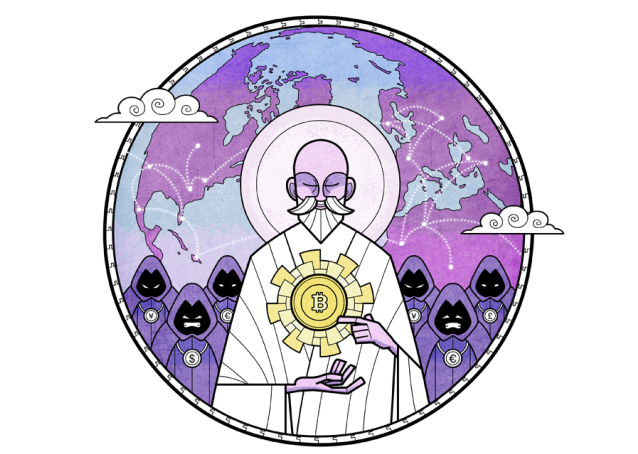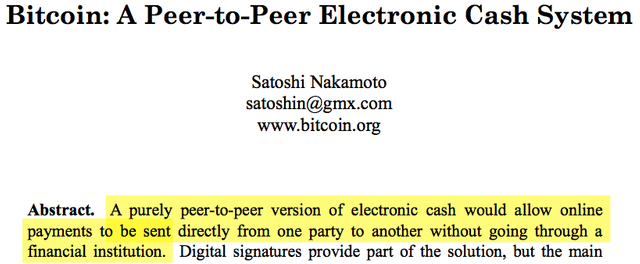
As cryptocurrencies – of which Bitcoin is the most famous – are attracting more and more people into the cryptospace, we see a larger variety of ideological baggage among the people in the space. Especially now, when many people just enter the space to make quick money and who don’t have any historical understanding of why cryptocurrencies came about, it has become more urgent to provide an understanding of its subversive ideological beginnings.
Therefore, I would like to write a short historical background that would inform the reader of Bitcoin's ideological beginnings.
Cryptographers and the Cypherpunk movement
In the 70’s and 80’s you had cryptographers who were concerned with privacy and who developed such things as untraceable electronic e-mail and signatures of untraceable payments. These signatures verify the sender of the payment.
Then in 1992, a group of people in Silicon Valley came together to discuss cryptography and implications thereof. This group of people became known as The Cypherpunks. They were concerned with government intrusion into our privacy and wanted to limit government involvement in our private lives as much as possible by creating widely dispersed computer systems that cannot be shut down.
In “A Cypherpunk’s Manifesto” (1992), you can read:
“We don’t much care if you don’t approve of the software we write. We know that software can’t be destroyed and that a widely dispersed system can’t be shut down.”
Notable members of the group are Julian Assange, founder of Wikileaks.
The philosophy of the Cypherpunks was neatly described by Timothy May in 1994 when he writes that digital money is the weakest link at this point and that
“… We believe the expansion into cyberspace, with secure communications, digital money, anonymity and pseudonymity, and other crypto-mediated interactions, will profoundly change the nature of economies and social interactions.
Governments will have a hard time collecting taxes.”
A Declaration of the Independence of Cyberspace
In 1996, a similar sentiment was expressed at the World Economic Forum Davos by John Perry Barlow who wrote “A Declaration of the Independence of Cyberspace” asserting that
“Governments of the Industrial World, you weary giants of flesh and steel, I come from Cyberspace, the new home of Mind. On behalf of the future, I ask you of the past to leave us alone. You are not welcome among us. You have no sovereignty where we gather.
We have no elected government, nor are we likely to have one, so I address you with no greater authority than that with which liberty itself always speaks. I declare the global social space we are building to be naturally independent of the tyrannies you seek to impose on us. You have no moral right to rule us nor do you possess any methods of enforcement we have true reason to fear.”
B-money: The first digital money
In 1998, Wei Dai, another person who was on the Cypherpunk mailing list created the pseudonymous digital money called ‘B-money’. We can view it as a precursor of what is now known as Bitcoin. He wrote that
“I am fascinated by Tim May’s crypto-anarchy. Unlike the communities traditionally associated with the word “anarchy”, in a crypto-anarchy the government is not temporarily destroyed but permanently forbidden and permanently unnecessary.”

PayPal
In the same year of 1998, PayPal was founded as Confinity. What many people don’t know is that PayPal had initially always wanted to create a new currency that would compete with the government currencies of the world like the USD.
This is what the founder, Peter Thiel, had to say about Bitcoin:
“Bitcoin is what PayPal was supposed to be.”
Let’s skip a decade, go to an economically tumultuous time. The world was heavily suffering from a great economic crisis when suddenly, in 2008, Bitcoin finally emerges.
Bitcoin
A pseudonymous person who calls himself Satoshi Nakamoti publishes a whitepaper saying that he has created a purly peer-to-peer version of electronic cash that would allow online payments to be sent directly from one party to another without going through a financial institution.

Satoshi has moreover mentioned that
“Governments are good at cutting off the heads of a centrally controlled networks like Napster, but pure P2P networks like Gnutella and Tor seem to be holding their own.”
He also calls it
“… very attractive to the libertarian viewpoint if we can explain it properly.”
No one knows who he is, but we can see from his whitepaper that he was extremely familiar with the works of those from the Cypherpunk group.
Conclusion
We can see that cryptocurrency was initially created from a philosophy that
- Is politically subversive
- Seeks privacy and maximum (economic) liberty for the individual
- Allows for voluntary economic exchanges
- And seeks a way out from the clutches of governments and banks
In one word, we can say that it’s a philosophy of decentralization. More specifically, the philosophy is also known as “libertarian anarchism”, “anarcho-capitalism”, “agorism”, and “voluntaryism”.
References
A Cypherpunk's Manifesto: https://www.activism.net/cypherpunk/manifesto.html
A Declaration of the independence of Cyberspace: https://www.eff.org/cyberspace-independence
Cyphernomicon 2.13: https://koeln.ccc.de/archiv/cyphernomicon/chapter2/2.13.html
wow awesome post !
Downvoting a post can decrease pending rewards and make it less visible. Common reasons:
Submit
YEAH! Thanks man.
Downvoting a post can decrease pending rewards and make it less visible. Common reasons:
Submit
Downvoting a post can decrease pending rewards and make it less visible. Common reasons:
Submit
Thank you! I appreciate your comment.
Downvoting a post can decrease pending rewards and make it less visible. Common reasons:
Submit
Great post!
Downvoting a post can decrease pending rewards and make it less visible. Common reasons:
Submit
You can count me in as a follower, and I thank you for this wonderful backgrounder to what I hope will be a series of important posts that you will make in response to what I hope will be stimulating discussion in this Steemit space. If the discussion fails to materialize and you get your material published elsewhere, do bring us synopses and links to the detailed texts.
Not only are there some deep philosophical issues worthy of discussion, a number surrounding the concept of money and its function in society including particular the power of various groups to control access to useful money, the way the world of big coin is evolving it is arguable that some key desires of its libertarian founders are going to be dashed partly by The Powers That Be and partly by a rather intractable governance problem that has reared its head within the community and seems to be more or less out of control at this point. (Witness the unfolding of hard forks which create a very bad brand for Bitcoin.)
I would like to keep the discussion rather philosophical and I invite you to suggest the directions (issues) in which you think the discussion should take.
Cheers!
BTW - one of the major point I see few making is the capacity of the cryptocurrencies to become the fulcrum for a major fall of the levels of deep poverty around the world. (By “deep poverty” I am referring to the inability to gain access to supplies of basic goods and services, many of which can be potentially available in a community but are not so practically because trade has been reduced to bartering.) This capacity is used when a cryptocurrency pops up in population/community segments where official money is either nonexistent or extremely hard to get; with the result that the use of the cryptoccurrency facilitates intra-community trading of goods and services.
I suspect that one reason I have seen more more references to this potential function of local-community-based cryptocurrencies is that it leads us away from the debate over whether cryptos will bring down states and the banking system. Well, I think we can now see that while citizens’ cryptos can be accommodated, the Powers That Be will use the block chain, cashless society and official cryptos to increase their profile.
Downvoting a post can decrease pending rewards and make it less visible. Common reasons:
Submit
Thank you for your reply. I truly appreciate that!
Cannot agree more with you on that.
Downvoting a post can decrease pending rewards and make it less visible. Common reasons:
Submit